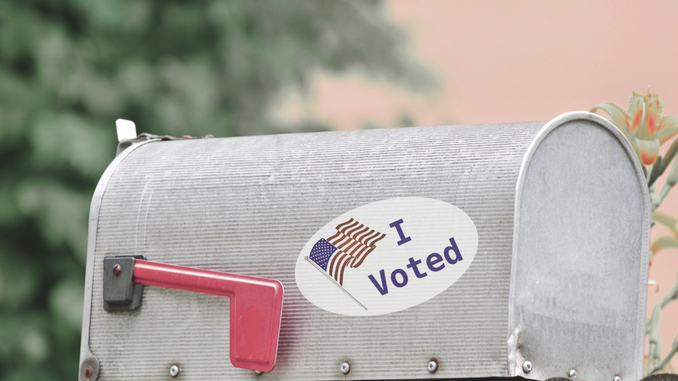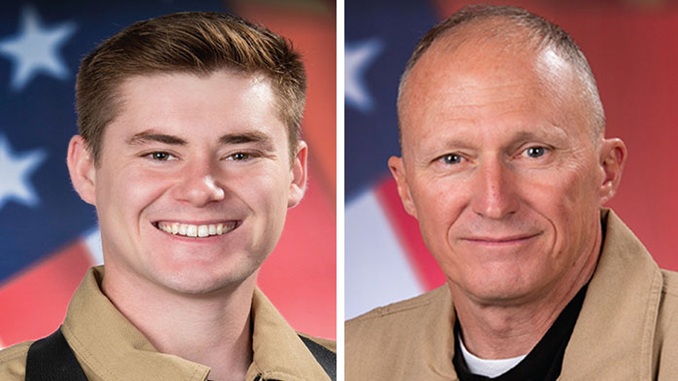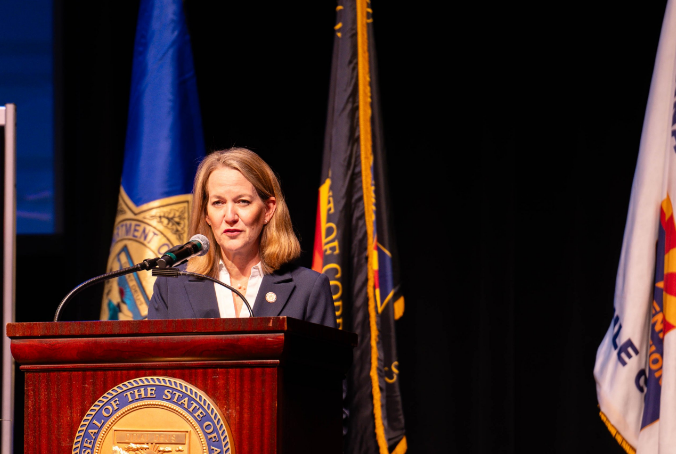
by Staff Reporter | Feb 9, 2026 | News
By Staff Reporter |
Several of the Maricopa County Board of Supervisors reviewed the recorder’s new signature verification process this week.
Supervisors Mark Stewart and Debbie Lesko visited the recorder’s office on Friday to observe what Recorder Justin Heap has promised to be a stronger approach to signature verification.
Also present were members of the Maricopa County Republicans and local election integrity advocates.
Supervisor Stewart publicized some of the training materials given to elections workers tasked with signature verification, including metrics for accepting or flagging signatures based on broad and local characteristics.
The new format for signature verification has two levels of review, the first for the user and second for the manager. At the level one user review, two signature reviewers of differing political parties compare signatures with the reference signature on file.
Signatures with obvious matches based on characteristics may be accepted as good signatures, while signature comparisons that yield differences outweighing similarities must be flagged for level two review by a manager.
The level two managerial review concerns the review of all available signatures in a voter’s registration record, which can be upwards of 50 samples. The signature pool could include signatures from voter registration forms, verified early voting affidavits, and in-person sign-ins from rosters.
Signatures consistent with the signature pool would be approved and sent to another level two manager of a differing political party for review, while nonmatching signatures would be set aside for further action. The recorder’s office has a set limit of disposition types: no signature, household exchange, need packet (a catch-all disposition type), deceased (which flags National Voter Registration Act research), and pre-questioned signature.
That last disposition qualifies for automatic submission to another manager of a differing political party for level two review.
All signatures with any discrepancy at any levels are required to be part of a mandatory audit review, set at two percent currently.
Training materials also made clear the efforts by the recorder’s office to integrate user-friendly updates to signature review software.
Level one reviewer screens will display the current election affidavit signature alongside the historical affidavit signatures from newest to oldest, removing the old requirement for users to scroll to compare signatures.
The training materials also stressed that users should default to flagging signatures for review for any reasons other than a “good signature” determination.
The visit marked an unusual bright point in the strained relationship between the board and the recorder.
The board and recorder have been engaged in a year-long legal battle in the Maricopa County Superior Court over elections administration powers.
This week marked a particularly tenuous moment in the battle after board leadership issued subpoenas against three of the recorder’s staff members.
The Maricopa County Superior Court sided with the recorder on the issue and put in place a temporary restraining order against the board to halt the subpoenas.
Friday’s visit was not a signal by the two visiting supervisors that they were on the recorder’s side in this court battle. Lesko reposted statements from Board Chair Kate Brophy McGee addressing the subpoenas. Stewart issued his own statement recognizing the validity of arguments from both his fellow board members and the recorder’s office.
AZ Free News is your #1 source for Arizona news and politics. You can send us news tips using this link.

by Staff Reporter | Feb 9, 2026 | News
By Staff Reporter |
Arizona lawmakers are showing their appreciation for law enforcement after a fatal helicopter crash took the lives of two on-duty responders.
The incident occurred late Wednesday night when an Arizona Department of Public Safety (AZDPS) helicopter crew lost control while dispatched to an active-shooter incident in Flagstaff.
The suspect in the active-shooter incident sustained non-fatal gunshot wounds and was apprehended.
The GOP-led Arizona House opened Thursday’s floor session with a moment of silence honoring the lives of the two lost. House Speaker Steve Montenegro expressed gratitude for Arizona’s law enforcement.
“These men served the people of Arizona with courage, with professionalism, and with quiet heroism. Every day, DPS personnel places themselves in harm’s way so that our communities can be safer,” said Montenegro.
State Sen. Kevin Payne, chair of the Senate Public Safety Committee, stressed in a press release the importance of supporting law enforcement in the present climate.
“This tragic incident highlights just how challenging, unpredictable, and dangerous the job of law enforcement can be,” said Payne. “Our public safety professionals rush toward danger when others cannot, often putting themselves in harm’s way without a second thought. Today, we take a moment to recognize that sacrifice and honor the courage, dedication, and sense of duty that characterize those who serve.”
Gov. Katie Hobbs offered support to the ones left behind by the tragedy.
Navajo Nation President Buu Nygren expressed his condolences.
“We are heartbroken by the tragic loss of two Arizona Department of Public Safety troopers who gave their lives in the line of duty,” said Nygren. “Their ultimate sacrifice reflects unwavering commitment, courage, and dedication to protecting others. Their legacy of service will not be forgotten.”
On Friday, AZDPS identified the two fallen as Pilot Robert Skankey, 61, and trooper-paramedic Hunter Bennett, 28.
Skankey served 22 years in the Marine Corps from 1988 to 2010, retiring as a lieutenant colonel before joining AZDPS in 2021. Skankey became aviation supervisor in 2024. He earned his master’s degree at Northern Arizona University.
He was an active member of his community: he founded the Kingman Young Marines nonprofit in 2015.
Skankey leaves behind a wife and four children.
Bennett joined AZDPS in 2022 as a top performer within his training academy, coming out at graduation with honors as class speaker. Prior to joining AZDPS, Bennett graduated magna cum laude from Arizona State University’s Barrett Honors College.
Bennett leaves behind his high school sweetheart, whom he married in 2024.
The crash remains under active investigation. The Federal Aviation Administration and National Transportation Safety Board are working with AZDPS on identifying the cause of the crash.
In a press conference on Friday, AZDPS advised that it was “inappropriate and irresponsible to speculate” on the cause of the crash, apparently alluding to certain rumors spreading across social media of an intentional takedown of the helicopter. One of those rumors concerned a private drone.
When asked about the drone rumor, AZDPS again stated that speculation was irresponsible and that their investigation remained active.
No gunfire came from the AZDPS helicopter.
AZDPS shared that the aircraft involved in the crash went through a maintenance check a few days before the crash. It was not considered outdated or slated for replacement.
Civilian footage of the crash showed the helicopter drop noiselessly out of the sky.
AZ Free News is your #1 source for Arizona news and politics. You can send us news tips using this link.

by Matthew Holloway | Feb 9, 2026 | News
By Matthew Holloway |
The Arizona House of Representatives nearly unanimously approved legislation on Tuesday to increase funding for the state’s legal defense fund related to Colorado River water rights, advancing the measure to the Arizona Senate. The bill passed the House with 56 votes in favor and 4 members not voting.
The measure, known as House Bill 2116, sponsored by Rep. Gail Griffin (R-LD14), and supported by fellow Republican Reps. Pamela Carter and Matt Gress of Legislative District 4, would appropriate $1 million from the state’s general fund to the Colorado River Litigation Fund for fiscal year 2026-27.
“Waiting until a lawsuit is filed to start planning would be reckless,” Griffin told AZ Family. “HB 2116 puts Arizona on offense, not defense.”
The Colorado River Litigation Fund was created during the 2025 legislative session to ensure that Arizona could pursue or defend legal action if disputes arise over its legally entitled share of Colorado River water.
In a joint news release, Carter said the additional funding would help protect Arizonans’ water supply by preparing the state for litigation if interstate negotiations fail. She noted that cities, including Phoenix and Scottsdale, remain dependent on water delivered through the Central Arizona Project (CAP).
“We must ensure a safe and reliable water supply for our residents,” Carter said in a statement. “If other states refuse to honor the Compact, we have to be ready to defend our rights in court. HB 2116 ensures Arizona is not caught flat-footed if negotiations fail and litigation becomes unavoidable. I voted yes to protect our water supply, families, jobs, and future.”
Gress emphasized that proactive funding was necessary in case the governor could not secure a satisfactory agreement in ongoing multistate negotiations over river water allocation, saying, “No one wants to go to court over water, but ignoring the risk of litigation would be irresponsible. This funding gives Arizona the ability to defend itself and its rights if the Governor fails to reach a fair agreement. When the water supply of millions of Arizonans and our state’s economy are on the line, every step we take in preparation matters.”
Griffin, chair of the House Natural Resources, Energy and Water Committee, also issued a statement highlighting the importance of readiness. “Other states have been positioning themselves for court long before this fund was created. Hopefully the fund will not be needed, but if it is — this bill makes sure that Arizona is ready to defend the water that millions of people and billions of dollars of economic activity depend on,” she said.
The House approved HB 2116, following bipartisan support in the House Natural Resources, Energy and Water Committee and the Appropriations Committee, and with unanimous approval from the House Rules Committee.
About 36 percent of Arizona’s water supply is drawn from the Colorado River, a resource shared by seven Western states that are currently negotiating a post-2026 operating agreement. If states fail to reach a new deal by the federal government’s deadline of Feb. 14, 2026, federal authorities could impose their own rules on water cuts.
Arizona’s top elected officials, both Republican and Democrat, penned a joint letter in November 2025, urging federal action in the absence of an agreement between the seven Colorado River Basin states. The letter cited the upper basin states’ refusal to commit to verifiable conservation.
In the news release from House GOP Leaders, they note, “Officials from Upper Basin states have openly stated they want to see [Central Arizona Project] CAP deliveries cut before accepting reductions themselves, despite their legal obligation under the 1922 Colorado River Compact to deliver minimum flows to Lower Basin states like Arizona.”
State leaders and stakeholders have increasingly framed the funding boost as a precautionary legal strategy amid complex negotiations and possible delivery shortfalls, as reported by KJZZ. Some water policy analysts say litigation may be difficult to avoid given entrenched positions among basin states; others urge continued negotiation to reach a sustainable agreement without court involvement.
The bill now moves to the Arizona Senate for further consideration.
Matthew Holloway is a senior reporter for AZ Free News. Follow him on X for his latest stories, or email tips to Matthew@azfreenews.com.

by Staff Reporter | Feb 8, 2026 | News
By Staff Reporter |
The GOP-led Arizona House censured Attorney General Kris Mayes over remarks they say endangered law enforcement.
The House passed HR2004 on Thursday with only Republican support. All Democrats voted against the measure.
State Rep. Joseph Chaplik (R-LD3), the bill sponsor, said in a press release that Mayes had spoken in a manner that proved her lack of fitness for office. House Republicans are urging the attorney general to resign.
“This was not a slip of the tongue. These reckless statements, which she has refused to retract, put officers in danger. When the top law enforcement official in the state fuels confusion, criminals listen and peace officers pay the price,” said Chaplik. “Our officers deserve leadership that protects them, not an Attorney General who puts targets on their backs.”
Last month, Mayes offered a response to the increased federal immigration enforcement in a sit-down interview that political leaders from both parties said was inappropriate and dangerous.
The attorney general faces accusations that she effectively created a legal justification for shooting ICE and other law enforcement agents in an interview with 12News.
“[I]f you reasonably believe that your life is in danger and you’re in your house or your car or on your property, that you can defend yourself with lethal force,” said Mayes.
Mayes later told KTAR News that Renee Good would have been justified in shooting ICE. Good was shot by an ICE agent last month after she began driving her car at him. Good was present on the scene to disrupt immigration enforcement operations. Her partner yelled at Good to drive after ICE agents ordered Good to stop and exit the vehicle.
“If you are really sure that they are ICE and they present a badge or they present identification, then I would not recommend using lethal force against them. But one of the worries that I have is [that] we have a Stand Your Ground law in Arizona,” said Mayes. “If you reasonably believe that your life is in danger and especially if you’re in your home or your automobile, essentially the Castle Doctrine, you can use lethal force to protect yourself.”
Gov. Katie Hobbs told reporters that Mayes’ speech was “inappropriate” and advised her to issue a retraction.
“It is the responsibility of every elected official to turn down the temperature and do everything we can to be very careful with our language about ramping up the potential for violence,” said Hobbs. “We are seeing across the county people’s fear increasing and the potential for violence.”
So far, Mayes has maintained that her remarks were misunderstood: she didn’t advise the shooting of ICE agents, she advised ICE agents that they were in danger of a justified shooting because they often wear masks.
“Arizonans do not want masked agents entering their homes without warrants. It is un-American and it threatens the rights and safety of everyone in our state,” said Mayes. “We have all witnessed the increasingly chaotic and dangerous activity of ICE agents in cities across the country.”
AZ Free News is your #1 source for Arizona news and politics. You can send us news tips using this link.

by Staff Reporter | Feb 8, 2026 | News
By Staff Reporter |
New polling reflects a continued high level of support for President Donald Trump’s mass deportations.
Earlier this week, the White House shared two sets of polling data that declare opinions of deportation remain positive.
Republicans, independents, and swing voters who responded all shared majority positive opinions on mass deportations in one poll from Cygnal: Republicans, 97%; independents, 59%; and swing voters, 64%. Only 25% of Democrat respondents expressed support for mass deportations, and 67% said they opposed.
This polling data came from just over 1,000 voters likely to vote in this year’s midterm general election.
A significant majority of all respondents also aligned when it came to interpretations of immigration law and enforcement.
73% of all respondents agreed that entering the country without permission constitutes breaking the law. 61% overall supported deportations for illegal aliens. 64% determined that illegal aliens were a very to somewhat severe problem: 33% of Democrats, 60% of independents, and 97% of Republicans.
A slimmer majority amounting to 58% of respondents rejected the Democrat-led proposal to defund Immigration and Customs Enforcement (ICE). Less than that, 54% overall, supported ICE enforcing federal immigration laws.
The Democrats’ fight within Congress to defund ICE mustered a partial shutdown this week.
The shutdown arose beyond Democrats’ general disagreement with mass deportations. Democratic leaders oppose Department of Homeland Security (DHS) approaches to carrying out immigration enforcement. Two American activists in two separate incidents died last month after their protests against ICE turned into interference with law enforcement operations.
Both individuals, Renee Good and Alex Pretti, were shot by ICE agents after refusing law enforcement orders.
Anti-ICE activists have also taken to protesting across Arizona. The Phoenix ICE office has been vandalized repeatedly, sometimes with death threats, and been subjected to protests that have devolved into rioting as activists resisted law enforcement orders.
This week’s partial shutdown was much shorter-lived than the longest one in America’s history that occurred last year, lasting over 40 days from October to November. President Donald Trump signed a spending package lifting the shutdown on Tuesday.
The second poll shared by the Trump administration came from Harvard University Center for American Political Studies (CAPS) and Harris. That polling reflected that 73% of Americans believe criminal illegal aliens should be deported. 2,000 registered voters served as respondents. Most of the voters said that price increases, inflation, and affordability along with immigration were their top two concerns.
Overall, the Harvard-Harris polling found that Trump’s approval rating on key issues (the economy, immigration, foreign affairs, administering the government, handling inflation, reducing the cost of government, returning America to its values, tariffs and trade policy, and fighting crime in America’s cities) ranged from 39% to 47%. The president’s highest rating level was 51% for response to anti-ICE protests in Minneapolis.
Overall, 38% of voters said the country was on the right track: 74% of Republicans, 15% of Democrats, and 24% of independent voters. Likely voters, not weighted in the median total, were at 43%. Congressional approval was worse: 32% overall.
35% of overall voters said their financial situation was improving, and 40% said it was declining.
Other polls have found dramatically different sentiments among the American people. Another three-day poll conducted by Ipsos determined that 62% of Americans believe current ICE enforcement activities go too far.
AZ Free News is your #1 source for Arizona news and politics. You can send us news tips using this link.

by Ethan Faverino | Feb 8, 2026 | Economy, News
By Ethan Faverino |
Arizona House Republicans on the Natural Resources, Energy, and Water Committee have taken action to address skyrocketing gas prices and utility bills, passing a sweeping package of bills designed to lower fuel costs, enhance energy reliability, and defend ratepayers.
Under the leadership of Chairman Gail Griffin (R-LD19), the measures align with the House Republican Majority Plan’s core priorities of unleashing economic prosperity, promoting government efficiency, and protecting individual rights and liberties.
The legislation, which advanced on a party-line vote with Democrats in opposition, targets the challenges faced by Arizona families, particularly in Maricopa and Pinal Counties, where severe summer fuel blend requirements have driven up prices at the pump. By prioritizing affordability and reliable power, these bills aim to ease the financial burden on households amid rising energy demand.
“The cost of living for Arizona families, including gas and electricity, continues to increase, and Republicans are acting,” stated Chairman Griffin. “This package puts affordability first by lowering fuel costs, protecting ratepayers from higher utility bills, and making sure Arizona has dependable power as demand grows. The Majority Plan is clear: government should work to ease the cost burden on families, not make them worse.”
Bills Tackling High Gas Prices
- HB 2145 (Rep. Griffin): Amends motor fuel statutes to empower the President of the Senate and Speaker of the House to jointly request EPA fuel waivers during shortages if the Governor does not act, providing a defense against price surges.
- HB 2400 (Reps. Willoughby, R-LD13, and Biasiucci, R-LD30): Implements a seasonal suspension of the state’s 18-cent gas tax from May through September in Maricopa and Pinal Counties. The bill ensures local governments are reimbursed for lost highway revenue through allocations from the Arizona Highway User Revenue Fund, including $27.588 million to counties, $39.93 million to cities and towns, and $5.082 million to larger municipalities. It also includes an emergency clause for immediate implementation and exempts the Department of Transportation from rulemaking for one year.
- HB 2696 (Rep. Willoughby): Directs the Arizona Commerce Authority to prioritize reducing fuel and gas prices as its primary objective for two years, expiring December 31, 2029. The authority must collaborate with the oil and gas industry to study repealing the cleaner-burning gasoline blend, building new pipelines, establishing a strategic reserve, and exploring in-state refineries, including reviving a proposed facility in Yuma County. Status updates will be provided to legislative committees, with a final report due by October 1, 2026.
- HB 2955 (Rep. Willoughby): Amends motor fuel standards to end the expensive summer fuel blend in populous counties, subject to EPA waiver under the Clean Air Act. It allows for gasoline compliant with ASTM D4814 and vapor pressure limits, addressing supply shortages and enabling lower-cost alternatives.
- HCM 2008 (Rep. Willoughby): A concurrent memorial urging Congress and the EPA to eliminate the federal gas tax on Arizona’s cleaner-burning gasoline in Maricopa and Pinal Counties from May to September or grant the EPA administrator emergency waiver authority for costlier blends. This recognizes Arizona’s progress toward National Ambient Air Quality Standards while highlighting the undue tax burden on specialized fuels.
Supporting these efforts are additional bills to promote long-term solutions:
- HB 2014 (Rep. Fink, R-LD27): Requires the Department of Environmental Quality (ADEQ) and Arizona Department of Agriculture to conduct air emissions modeling and feasibility studies on alternative gasoline blends, including federal reformulated, California phase 3, and conventional options. Reports must be published by September 30, 2027, with $100,000 appropriations each for modeling and studies.
- HB 2401 (Willoughby and Biasiucci): Mandates biennial reviews by ADEQ of fuel formulations available under federal standards, assessing air quality impacts in regulated areas, and submitting recommendations to the Department of Agriculture, the Governor, the President of the Senate, the Speaker of the House, and the Secretary of State by December 31 of each review year.
- HB 2428 (Griffin): Authorizes voluntary mobile emissions reduction credit programs, permitting emissions credits for nonroad engines under Clean Air Act guidelines, with permits issued by ADEQ for up to 20 years, supported by chambers of commerce, utilities, and Maricopa County.
“Today we heard from organizations with the time and resources to lobby against affordable prices for Arizona families, but not from the families paying more at the pump,” explained Majority Whip Julie Willoughby. “Working families cannot take time off to come to the Capitol and ask for relief; that is why we are here to help be their voices.”
“Eighteen cents a gallon may sound small to some, but it matters to families trying to make ends meet,” Willoughby added. “I will do everything in my power to deliver relief now while we continue working to fix the fuel blend and supply problems. Families need lower prices, not excuses.”
Bills Ensuring Energy Reliability and Ratepayer Protections
- HB 2331 (Reps. Marshall, R-LD7 and Heap, R-LD10): Renames and expands energy reliability statutes to require public power entities and service corporations to prioritize domestically produced fuels, minimize foreign reliance, and evaluate resources for affordability, reliability, and cleanliness. Defines “clean energy” to include low-emission sources like nuclear and natural gas, with reliable sources needing at least 50% capacity factor and rapid ramp-up capabilities. The bill emphasizes hydrocarbons and finds domestic sourcing essential for public health and safety.
- HB 2756 (Reps. Griffin and Blackman, R-LD7): Adds provisions for public power entities and electric corporations to report quarterly on new extra-high load factor customers, including interconnection requests and completions. These customers must be factored into load growth projections. The Arizona Corporation Commission (ACC) is directed to adopt rules on contracts, minimum billing, and pre-execution reviews to protect other ratepayers, excluding member-owned cooperatives. Requires cost-of-service studies within 180 days and an ACC workshop within 90 days to assess impacts on residential bills and potential new customer classes.
These bills now advance for further legislative consideration.
Ethan Faverino is a reporter for AZ Free News. You can send him news tips using this link.






